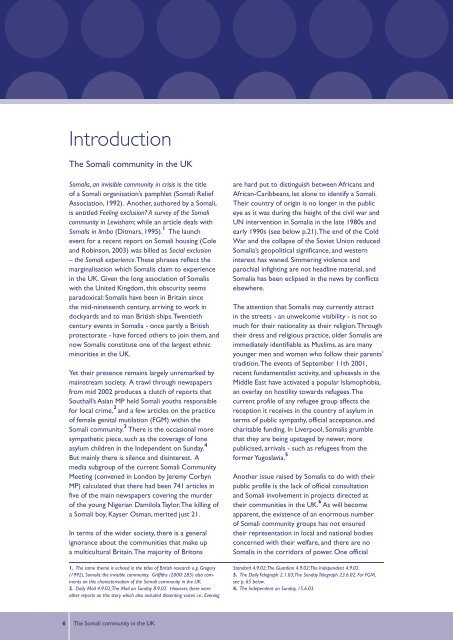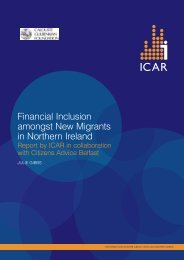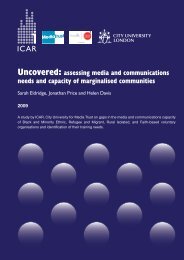The Somali community in the UK: What we know and how we ... - ICAR
The Somali community in the UK: What we know and how we ... - ICAR
The Somali community in the UK: What we know and how we ... - ICAR
Create successful ePaper yourself
Turn your PDF publications into a flip-book with our unique Google optimized e-Paper software.
Introduction<br />
<strong>The</strong> <strong>Somali</strong> <strong>community</strong> <strong>in</strong> <strong>the</strong> <strong>UK</strong><br />
<strong>Somali</strong>s, an <strong>in</strong>visible <strong>community</strong> <strong>in</strong> crisis is <strong>the</strong> title<br />
of a <strong>Somali</strong> organisation’s pamphlet (<strong>Somali</strong> Relief<br />
Association, 1992). Ano<strong>the</strong>r, authored by a <strong>Somali</strong>,<br />
is entitled Feel<strong>in</strong>g exclusion? A survey of <strong>the</strong> <strong>Somali</strong><br />
<strong>community</strong> <strong>in</strong> Lewisham; while an article deals with<br />
<strong>Somali</strong>s <strong>in</strong> limbo (Ditmars, 1995). 1 <strong>The</strong> launch<br />
event for a recent report on <strong>Somali</strong> hous<strong>in</strong>g (Cole<br />
<strong>and</strong> Rob<strong>in</strong>son, 2003) was billed as Social exclusion<br />
– <strong>the</strong> <strong>Somali</strong> experience. <strong>The</strong>se phrases reflect <strong>the</strong><br />
marg<strong>in</strong>alisation which <strong>Somali</strong>s claim to experience<br />
<strong>in</strong> <strong>the</strong> <strong>UK</strong>. Given <strong>the</strong> long association of <strong>Somali</strong>s<br />
with <strong>the</strong> United K<strong>in</strong>gdom, this obscurity seems<br />
paradoxical: <strong>Somali</strong>s have been <strong>in</strong> Brita<strong>in</strong> s<strong>in</strong>ce<br />
<strong>the</strong> mid-n<strong>in</strong>eteenth century, arriv<strong>in</strong>g to work <strong>in</strong><br />
dockyards <strong>and</strong> to man British ships. T<strong>we</strong>ntieth<br />
century events <strong>in</strong> <strong>Somali</strong>a - once partly a British<br />
protectorate - have forced o<strong>the</strong>rs to jo<strong>in</strong> <strong>the</strong>m, <strong>and</strong><br />
now <strong>Somali</strong>s constitute one of <strong>the</strong> largest ethnic<br />
m<strong>in</strong>orities <strong>in</strong> <strong>the</strong> <strong>UK</strong>.<br />
Yet <strong>the</strong>ir presence rema<strong>in</strong>s largely unremarked by<br />
ma<strong>in</strong>stream society. A trawl through newspapers<br />
from mid 2002 produces a clutch of reports that<br />
Southall’s Asian MP held <strong>Somali</strong> youths responsible<br />
for local crime, 2 <strong>and</strong> a few articles on <strong>the</strong> practice<br />
of female genital mutilation (FGM) with<strong>in</strong> <strong>the</strong><br />
<strong>Somali</strong> <strong>community</strong>. 3 <strong>The</strong>re is <strong>the</strong> occasional more<br />
sympa<strong>the</strong>tic piece, such as <strong>the</strong> coverage of lone<br />
asylum children <strong>in</strong> <strong>the</strong> Independent on Sunday. 4<br />
But ma<strong>in</strong>ly <strong>the</strong>re is silence <strong>and</strong> dis<strong>in</strong>terest. A<br />
media subgroup of <strong>the</strong> current <strong>Somali</strong> Community<br />
Meet<strong>in</strong>g (convened <strong>in</strong> London by Jeremy Corbyn<br />
MP) calculated that <strong>the</strong>re had been 741 articles <strong>in</strong><br />
five of <strong>the</strong> ma<strong>in</strong> newspapers cover<strong>in</strong>g <strong>the</strong> murder<br />
of <strong>the</strong> young Nigerian Damilola Taylor. <strong>The</strong> kill<strong>in</strong>g of<br />
a <strong>Somali</strong> boy, Kayser Osman, merited just 21.<br />
In terms of <strong>the</strong> wider society, <strong>the</strong>re is a general<br />
ignorance about <strong>the</strong> communities that make up<br />
a multicultural Brita<strong>in</strong>. <strong>The</strong> majority of Britons<br />
1. <strong>The</strong> same <strong>the</strong>me is echoed <strong>in</strong> <strong>the</strong> titles of British research e.g. Gregory<br />
(1992), <strong>Somali</strong>s: <strong>the</strong> <strong>in</strong>visible <strong>community</strong>. Griffiths (2000: 285) also comments<br />
on this characterisation of <strong>the</strong> <strong>Somali</strong> <strong>community</strong> <strong>in</strong> <strong>the</strong> <strong>UK</strong>.<br />
2. Daily Mail 4.9.02; <strong>The</strong> Mail on Sunday 8.9.02. Ho<strong>we</strong>ver, <strong>the</strong>re <strong>we</strong>re<br />
o<strong>the</strong>r reports on this story which also <strong>in</strong>cluded dissent<strong>in</strong>g voices i.e.: Even<strong>in</strong>g<br />
are hard put to dist<strong>in</strong>guish bet<strong>we</strong>en Africans <strong>and</strong><br />
African-Caribbeans, let alone to identify a <strong>Somali</strong>.<br />
<strong>The</strong>ir country of orig<strong>in</strong> is no longer <strong>in</strong> <strong>the</strong> public<br />
eye as it was dur<strong>in</strong>g <strong>the</strong> height of <strong>the</strong> civil war <strong>and</strong><br />
UN <strong>in</strong>tervention <strong>in</strong> <strong>Somali</strong>a <strong>in</strong> <strong>the</strong> late 1980s <strong>and</strong><br />
early 1990s (see below p.21). <strong>The</strong> end of <strong>the</strong> Cold<br />
War <strong>and</strong> <strong>the</strong> collapse of <strong>the</strong> Soviet Union reduced<br />
<strong>Somali</strong>a’s geopolitical significance, <strong>and</strong> <strong>we</strong>stern<br />
<strong>in</strong>terest has waned. Simmer<strong>in</strong>g violence <strong>and</strong><br />
parochial <strong>in</strong>fight<strong>in</strong>g are not headl<strong>in</strong>e material, <strong>and</strong><br />
<strong>Somali</strong>a has been eclipsed <strong>in</strong> <strong>the</strong> news by conflicts<br />
elsewhere.<br />
<strong>The</strong> attention that <strong>Somali</strong>s may currently attract<br />
<strong>in</strong> <strong>the</strong> streets - an un<strong>we</strong>lcome visibility - is not so<br />
much for <strong>the</strong>ir nationality as <strong>the</strong>ir religion. Through<br />
<strong>the</strong>ir dress <strong>and</strong> religious practice, older <strong>Somali</strong>s are<br />
immediately identifiable as Muslims, as are many<br />
younger men <strong>and</strong> women who follow <strong>the</strong>ir parents’<br />
tradition. <strong>The</strong> events of September 11th 2001,<br />
recent fundamentalist activity, <strong>and</strong> upheavals <strong>in</strong> <strong>the</strong><br />
Middle East have activated a popular Islamophobia,<br />
an overlay on hostility towards refugees. <strong>The</strong><br />
current profile of any refugee group affects <strong>the</strong><br />
reception it receives <strong>in</strong> <strong>the</strong> country of asylum <strong>in</strong><br />
terms of public sympathy, official acceptance, <strong>and</strong><br />
charitable fund<strong>in</strong>g. In Liverpool, <strong>Somali</strong>s grumble<br />
that <strong>the</strong>y are be<strong>in</strong>g upstaged by ne<strong>we</strong>r, more<br />
publicised, arrivals - such as refugees from <strong>the</strong><br />
former Yugoslavia. 5<br />
Ano<strong>the</strong>r issue raised by <strong>Somali</strong>s to do with <strong>the</strong>ir<br />
public profile is <strong>the</strong> lack of official consultation<br />
<strong>and</strong> <strong>Somali</strong> <strong>in</strong>volvement <strong>in</strong> projects directed at<br />
<strong>the</strong>ir communities <strong>in</strong> <strong>the</strong> <strong>UK</strong>. 6 As will become<br />
apparent, <strong>the</strong> existence of an enormous number<br />
of <strong>Somali</strong> <strong>community</strong> groups has not ensured<br />
<strong>the</strong>ir representation <strong>in</strong> local <strong>and</strong> national bodies<br />
concerned with <strong>the</strong>ir <strong>we</strong>lfare, <strong>and</strong> <strong>the</strong>re are no<br />
<strong>Somali</strong>s <strong>in</strong> <strong>the</strong> corridors of po<strong>we</strong>r. One official<br />
St<strong>and</strong>ard 4.9.02; <strong>The</strong> Guardian 4.9.02; <strong>The</strong> Independent 4.9.02.<br />
3. <strong>The</strong> Daily Telegraph 2.1.03; <strong>The</strong> Sunday Telegraph 23.6.02. For FGM,<br />
see p. 65 below.<br />
4. <strong>The</strong> Independent on Sunday, 15.6.03.<br />
6 <strong>The</strong> <strong>Somali</strong> <strong>community</strong> <strong>in</strong> <strong>the</strong> <strong>UK</strong>

















